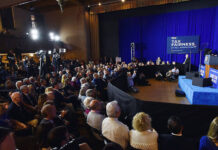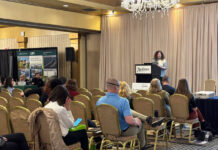FACTORYVILLE — Technology teacher Boyd Semken, librarian Kelly Hopkins, and social studies teacher Katie Lane proposed the Lackawanna Trail School District should pursue its own cyber school during a school board meeting April 11.
Hopkins said that if a Trail student enters a cyber charter school in kindergarten and continues to the highest level of cyber school at $26,000 per year, that student over 13 years will cost the district $338,000. School districts pay for students to attend cyber school.
She mentioned that in addition to the financial issues, a student in cyber charter school can have a lack of success.
“A study by the Stanford University Center for Research on Education in October 2015 stated that if a students who goes to an online cyber school is likely to lose 72 days of learning in reading and 180 days of learning in math,” she said.
Hopkins said students in a district-run cyber program can come back to the schools they left. Students can also get involved in Trail’s organizations and activities, as well as receive a Lackawanna Trail diploma through such a program.
“Based on 50 percent return of our students next year if we can get this off the ground, we’re looking at a $201,000 savings,” she said.
Hopkins said that with these savings, Trail would be able to increase advanced placement course offerings. She then listed school districts that use in-house cyber programs include Old Forge, Carbondale and Pittsburgh. She mentioned that Pittsburgh’s school district was able to bring back 126 students and save $1.1 million.
Semken said the district has three choices: Virtual Learning Network (VLN), K12, and Edison Learning. Semken said that VLN provides students everything including new computer, textbooks, tech support for full-time students, and on-site training for staff. It costs $3,875 per student.
He said that the difference between VLN and K12 is that K12 doesn’t provide computers or training support. He said Edison Learning also doesn’t provide computers or tech support but costs less than the VLN Platform.
Semken asked the board members for a room in the high school building where students might do a blended program.
“A blended program would be where they (students) would actually come to our building (high school),” he said. “They would do cyber school in a room and then possibly come to special classes.”
Lane listed reasons why students would leave Lackawanna Trail to attend a cyber charting school, such as family life struggles, anxiety, or social issues.
“We feel that if we have a cyber-blended option with a student retention team, in what we are calling a ‘safe haven classroom,’ we might be able to address some of those needs of those students and keep them within the brick and mortar first,” she said.
Lane then mentioned that if they can work through some conflict resolution for two weeks, that will have a safe haven classroom.
High school principal Mark Murphy wondered whether the curriculum of the cyber classes are aligned with Trail’s classes.
“If the student chooses to go away (to a cyber charting school) for two months (and decided to come back to Lackawanna Trail), there might be large gaps,” he said. “There’s no crosswalk to the curriculum.”
Hopkins said the three cyber school options mentioned above are currently piloting a program that allows teachers to author their own classes.
In other business, the board voted to approve:
• The academic calendar of 2016-17 school year.
• Nutrition Group, Inc. as the Food Service Management Company for the 2016-17 school year based on competitive bids submitted publicly on March 7, 2016.
• The retirement of Donald Rupp, high school science teacher, effective June 30, 2016.
• The retirement of Debra Reynolds, elementary assistant cafeteria manager, effective June 30, 2016.


